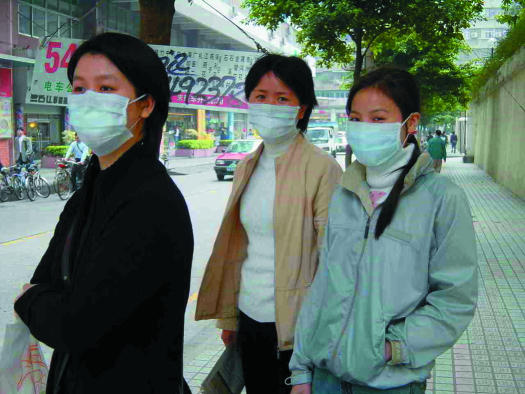The World Health Organization has issued a global alert as reports of over 150 cases of severe acute respiratory syndrome, an atypical pneumonia of unknown cause, came in from Vietnam and Hong Kong, as well as Canada, Taiwan, Thailand, and Singapore.
By 17 March nine deaths had been reported, seven in Asia and two in Canada. Doctors were also treating two people in Frankfurt, Germany, who had flown in from Singapore and a patient in Manchester, who had recently flown in from Hong Kong (see article below).
WHO is working with authorities in China, Hong Kong, and Vietnam to establish whether or not recent outbreaks in the three countries are related.
An outbreak in Guangdong province, China, in February this year killed five and hospitalised 305 people (22 February, p 416). Two of the people who died were found to have had chlamydia infection. No further cases have been reported from China since 11 February.
The outbreak in Vietnam was traced to a US Chinese man who was admitted to hospital on 26 February with a high fever, dry cough, myalgia, and mild sore throat. His condition deteriorated, and he died on 13 March after being transferred to Hong Kong.
Healthcare workers in Hanoi who had been in contact with the man became ill—and by 17 March 43 cases had been confirmed with an additional five unconfirmed cases. “There is still reason to be concerned about Vietnam,” said Peter Cordingley, WHO's spokesman in Manila. Five patients are in critical condition, and two have died.
In all but one of the Hanoi cases (the son of a healthcare worker) the patients had had direct contact with the hospital where the index case was first treated. Singapore has reported 20 cases, Canada nine, and Taiwan three. Thailand has reported one case, directly connected with the Hanoi index case. Cases in Singapore and Canada have been linked to Hong Kong. Earlier reports of single cases in the Philippines and Indonesia were false alarms.
The biggest concentration of cases is in Hong Kong, where by 1 pm on 18 March a total of 123 patients suspected of having the disease had been admitted to hospital, of whom 111 had symptoms of the syndrome. The Prince of Wales Hospital is at the centre of the outbreak, where the index case was identified on 16 March. A total of 44 healthcare workers at the hospital have now been admitted to hospital, of whom 36 have atypical pneumonia.
“The numbers are large because we were unable to identify the index case. This is a very unusual phenomenon—it's not run of the mill atypical pneumonia,” said Dr Yeoh Eng-kiong, Hong Kong's secretary for health, welfare, and food.
Figure.
MARK ROSLING
Women wearing face masks in Guangzhou, Guangdong province, China, where an outbreak of atypical pneumonia killed five people



